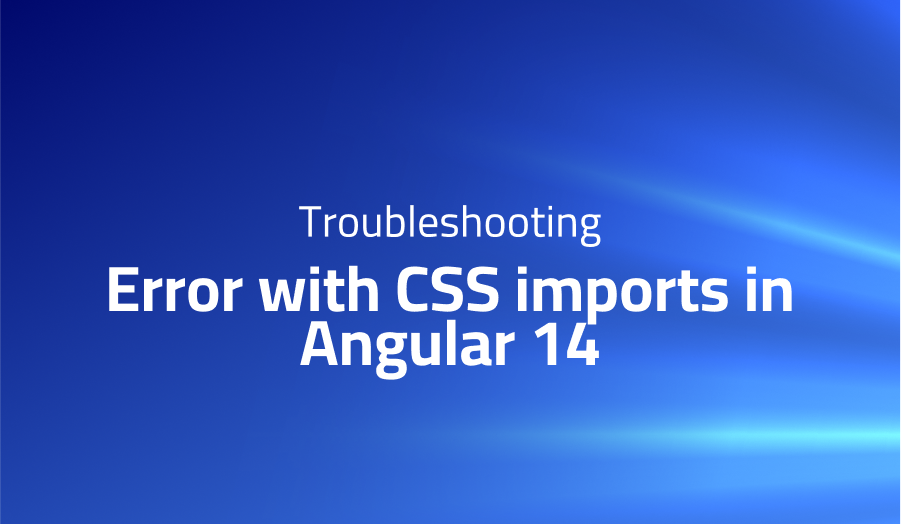

Error with CSS imports in Angular 14
Explanation of the problem
After updating to Angular 14, console log errors related to module parsing are encountered. Specifically, there are errors related to the parsing of CSS files from the “@fullcalendar” package. The following CSS files are reported to have failed module parsing: “main.css” files in the “@fullcalendar/common”, “@fullcalendar/daygrid”, “@fullcalendar/list”, and “@fullcalendar/timegrid” directories. The errors indicate that no appropriate loaders are configured to handle these CSS files, resulting in unexpected token errors.
Troubleshooting with the Lightrun Developer Observability Platform
Getting a sense of what’s actually happening inside a live application is a frustrating experience, one that relies mostly on querying and observing whatever logs were written during development.
Lightrun is a Developer Observability Platform, allowing developers to add telemetry to live applications in real-time, on-demand, and right from the IDE.
- Instantly add logs to, set metrics in, and take snapshots of live applications
- Insights delivered straight to your IDE or CLI
- Works where you do: dev, QA, staging, CI/CD, and production
Start for free today
Problem solution for: Error with CSS imports in Angular 14
To solve the module parsing errors related to the CSS files from the “@fullcalendar” package in Angular 14, you need to configure appropriate loaders in your webpack configuration. These loaders will handle the processing of the CSS files and resolve the unexpected token errors.
First, ensure that you have the necessary loaders installed as dependencies in your project. You may need loaders such as “style-loader” and “css-loader” to handle CSS files. Install them using the following command:
npm install style-loader css-loader --save-dev
Once the loaders are installed, you can configure them in your webpack configuration file, typically named webpack.config.js. Add the following rules to specify how CSS files should be processed:
module.exports = {
// ... other webpack configuration options
module: {
rules: [
// Rule to handle CSS files
{
test: /\.css$/,
use: ['style-loader', 'css-loader'],
},
],
},
// ... other webpack configuration options
};
By adding the above rule, the CSS files will be processed using the “style-loader” and “css-loader” when encountered in the build process. This will resolve the module parsing errors for the “@fullcalendar” CSS files.
Make sure to rebuild your project after making these changes to the webpack configuration. The CSS files should now be properly loaded and parsed, eliminating the unexpected token errors encountered previously.
Other popular problems with fullcalendar-angular
Problem 1: One common problem with fullcalendar-angular is the incorrect rendering of events or calendar views. This can occur when the required dependencies or configuration are not properly set up, leading to issues such as events not appearing on the calendar or incorrect display of calendar views.
To resolve this problem, ensure that you have the necessary dependencies installed in your project. Make sure to include the required scripts and stylesheets in your HTML file. Additionally, verify that you have provided the correct configuration options when initializing the fullcalendar-angular component.
Here is an example of how to properly configure and initialize fullcalendar-angular:
// Import necessary dependencies
import { Component, ViewChild, AfterViewInit } from '@angular/core';
import { FullCalendarComponent } from '@fullcalendar/angular';
@Component({
selector: 'app-calendar',
template: `
<full-calendar #calendar [options]="calendarOptions"></full-calendar>
`,
})
export class CalendarComponent implements AfterViewInit {
@ViewChild('calendar') calendar: FullCalendarComponent;
calendarOptions: any = {
// Provide necessary options here
// ...
};
ngAfterViewInit() {
// Initialize the calendar
this.calendar.getApi().render();
}
}
By ensuring that you have the correct dependencies, proper configuration, and correct initialization, you can address issues related to event rendering and calendar view in fullcalendar-angular.
Problem 2: Another common problem with fullcalendar-angular is the incorrect handling of user interactions, such as clicking on events or navigating between calendar views. This can occur when the event handlers or callbacks are not properly implemented or when there are conflicts with other event handlers in your application.
To resolve this problem, make sure to properly define and implement the event handlers or callbacks provided by fullcalendar-angular. For example, you can handle the eventClick event to perform actions when an event is clicked:
// Inside the calendarOptions object
calendarOptions: any = {
// Other options...
eventClick: this.handleEventClick,
};
// Event click handler
handleEventClick(info: any) {
// Handle the event click here
console.log('Event clicked:', info.event);
// Perform any necessary actions
}
Ensure that your event handlers are correctly implemented and that they do not conflict with other event handlers or event binding mechanisms in your application.
Problem 3: A third common problem with fullcalendar-angular is the improper styling or customization of the calendar component. This can occur when the CSS styles are not correctly applied or when conflicts arise with existing styles in your application.
To address this problem, make sure to properly include and configure the required stylesheets for fullcalendar-angular. You can import the necessary styles in your component’s style file or in the global styles of your application:
// Import fullcalendar styles
@import '~@fullcalendar/common/main.css';
@import '~@fullcalendar/daygrid/main.css';
@import '~@fullcalendar/timegrid/main.css';
@import '~@fullcalendar/list/main.css';
Additionally, you can customize the calendar component by overriding the default styles using CSS rules specific to your application. Ensure that your custom styles are applied after the fullcalendar styles to avoid conflicts.
By correctly applying the necessary stylesheets and properly customizing the calendar component, you can resolve styling issues with fullcalendar-angular.
A brief introduction to fullcalendar-angular
fullcalendar-angular is a powerful Angular library that provides integration with the FullCalendar JavaScript library. It allows developers to easily incorporate interactive calendars into their Angular applications. The library offers a set of Angular components and directives that enable seamless integration with FullCalendar functionalities, such as event management, calendar views, and customization options.
At its core, fullcalendar-angular leverages the FullCalendar library’s robust features, including the ability to display events in various calendar views like month, week, and day. It supports drag-and-drop interactions for event creation and resizing, as well as event click and selection handling. The library also enables easy navigation between calendar views, such as switching to different months or weeks. Furthermore, fullcalendar-angular offers extensive customization options through its configuration options, allowing developers to tailor the calendar’s appearance and behavior to their specific requirements.
To utilize fullcalendar-angular, developers can leverage the provided Angular components and directives. These components, such as FullCalendarComponent and CalendarOptions, facilitate the integration process and provide a seamless interface for interacting with the FullCalendar functionality. By utilizing these components, developers can easily create and configure the calendar, define event sources, handle user interactions, and apply customizations. The library embraces the Angular ecosystem and follows Angular’s best practices, ensuring compatibility and ease of use for Angular developers.
In summary, fullcalendar-angular simplifies the process of incorporating feature-rich calendars into Angular applications. By leveraging the FullCalendar library and providing Angular-specific components and directives, developers can efficiently implement interactive calendars with a high degree of customization and flexibility.
Most popular use cases for fullcalendar-angular
- Event Scheduling and Management: fullcalendar-angular is a versatile library that enables developers to implement event scheduling and management features in their Angular applications. With the ability to define and display events in various calendar views, developers can easily create a robust scheduling system. The following code snippet demonstrates how to define and display events using the
FullCalendarComponent:
import { FullCalendarComponent } from '@fullcalendar/angular';
@Component({
// Component configuration
})
export class MyCalendarComponent implements OnInit {
calendarEvents: any[] = [
{
title: 'Event 1',
start: '2023-05-01',
end: '2023-05-03'
},
{
title: 'Event 2',
start: '2023-05-05',
end: '2023-05-07'
}
];
// Other component code
ngOnInit() {
// Initialization code
}
}
- Customization and Styling: fullcalendar-angular provides extensive customization options to tailor the appearance and behavior of the calendar to match specific design requirements. Developers can customize the calendar’s layout, colors, fonts, and event rendering using the provided configuration options. The following code snippet demonstrates how to customize the calendar’s appearance using the
CalendarOptions:
import { FullCalendarComponent } from '@fullcalendar/angular';
@Component({
// Component configuration
})
export class MyCalendarComponent implements OnInit {
calendarOptions: any = {
// Custom options
headerToolbar: {
left: 'prev,next',
center: 'title',
right: 'dayGridMonth,timeGridWeek,timeGridDay'
},
themeSystem: 'bootstrap'
};
// Other component code
ngOnInit() {
// Initialization code
}
}
- Interactivity and User Experience: fullcalendar-angular enables developers to enhance the user experience by providing interactive features like event drag-and-drop, event resizing, and click handling. These features allow users to intuitively manage and modify events within the calendar. Additionally, the library supports navigation between different calendar views, enabling users to switch between months, weeks, and days seamlessly. By utilizing the provided event handling mechanisms, developers can respond to user interactions and perform actions accordingly, providing a dynamic and engaging user interface.
It’s Really not that Complicated.
You can actually understand what’s going on inside your live applications.




